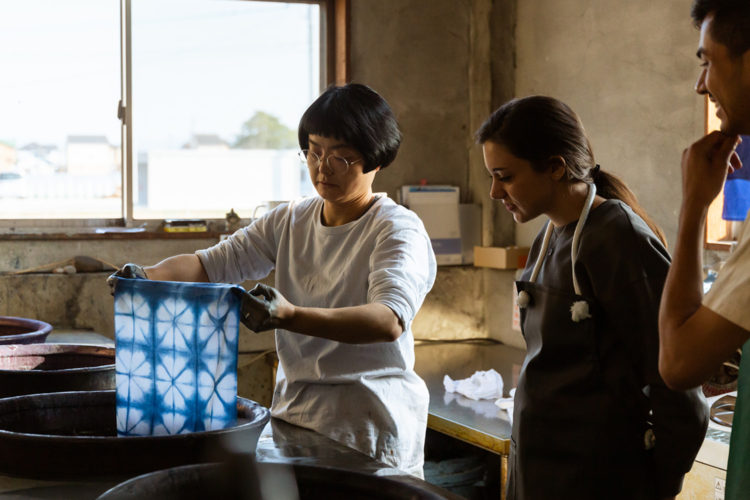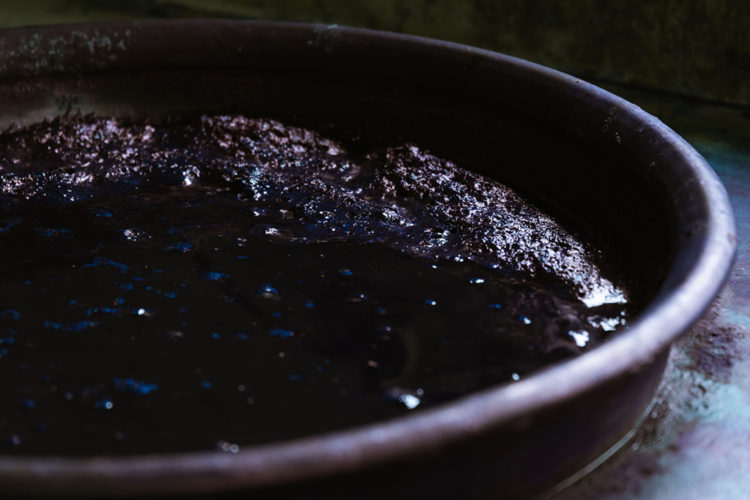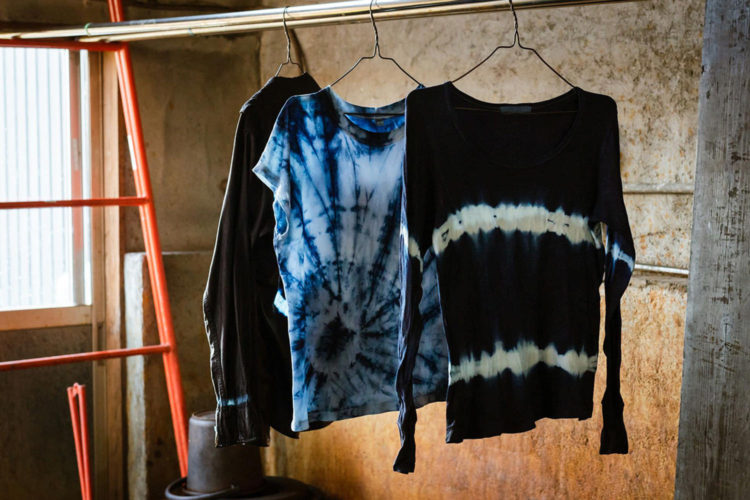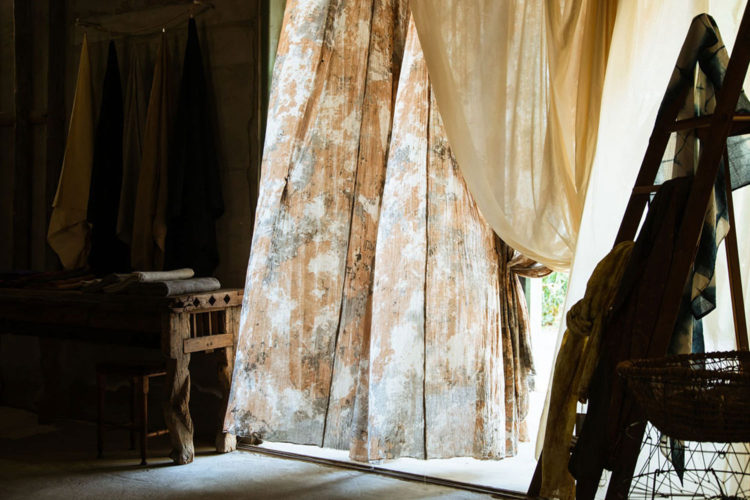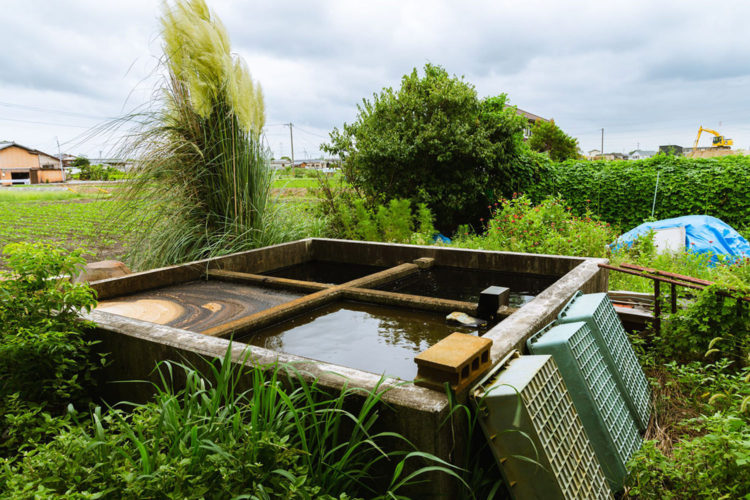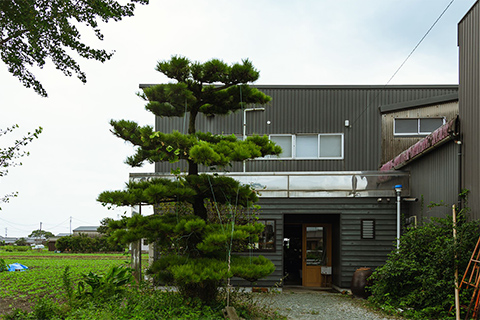Upcycle Clothes with Natural Indigo Dye (4hrs)
Takarajima Senkou is a textile dyeing workshop that specializes in natural dyes, located in Oki-machi, Mizuma-gun, the southern part of Fukuoka Prefecture. In 2001, Chiharu Ogomori established the workshop in her hometown of Oki, with the aim of creating beautiful, naturally dyed textiles more accessible — pieces that can even be integrated into the modern economic cycle. In this program, Ogomori herself will personally guide you through the Takarajima Senkou studio and its creations. Afterwards, enjoy a unique experience of upcycling used clothes and fabrics by dyeing them in Takarajima Senkou’s signature natural Indian indigo.
- ● Learn about the activities and philosophy of Takarajima Senkou, a workshop that explores new frontiers of natural dyeing
- ● Learn about the fermentation process of Indian indigo
- ● Experience the exciting moment when your dyed clothes change color after coming into contact with oxygen
- ● Give used clothing or textiles new life through indigo
- ● Tour the dye workshop, which is usually not open to the public, and learn about Takarajima Senkou’s sustainable practices, such as their drainage system
- ● Browse the studio shop Takarajima Soko, also not usually open to the public
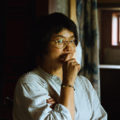
- Chiharu OgomoriOwner and Founder, Takarajima Senkou
- Raised in Mizuma County, Fukuoka Prefecture. With a background in graphic design and dye arts, Ogomori developed her skills through a wide range of training in the world of dyeing: from a plant dye artist’s studio to learning about chemical processes at a commercial dyeing factory. While focusing on dyeing and processing for apparel brands through the original equipment manufacturer (OEM) model, Takarajima Senkou also launched its own original brand in 2013.
A Creative Workshop Specializing in Natural Dyes
Depending on the designs and functions of the finished products, which range from made-to-order pieces to original brand clothing and fabrics, Takarajima Senkou uses a variety of raw materials in its signature natural dyeing process. First, Takarajima Senkou’s speciality: Indian indigo. A plant of the legume family, it is more affordable than domestic Japanese indigo and has a higher purity, which allows the workshop to maintain a stable production volume. Other natural dyes are also used to produce a wide range of creative expressions — myrobalan and catechu for brown shades, sappanwood for dark red, and madder plants for light pink. Other techniques include first pretreating textiles with catechin and dyeing the fabric repeatedly with mud (which results in the accumulation of iron-based dye), and using Japanese sumi ink made of kneaded soot and nikawa (animal glue).
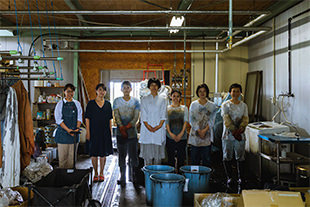
Spreading Craft Through Medium Volume Production
Unlike more stable chemical dyes, natural dyes create many unique variabilities in the control and dyeing processes. Working with such materials requires adequate knowledge and experience to deal with such fluctuations. For example, after indigo is fermented in an earthenware vat, it needs to be regulated through precise temperature control and occasionally “feeding” it sugar; the dye density is contingent upon the indigo solution’s condition. All dyeing is also done by hand, and unique patterns are created by arranging various resist-dyeing techniques that have been passed down since ancient times, including itajime (clamping fabric between wooden boards), shibori (tying fabric with bands), and hammer-dyeing. Takarajima Senkou is a one-of-a-kind workshop in that its production system enables the medium-volume production of naturally dyed textiles through the integration of handmade crafts with a quantified dyeing process and strict production control.
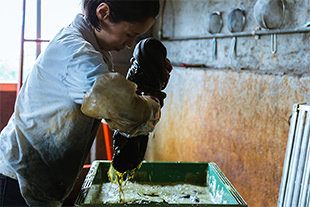
Upcyle Clothes and Fabrics with Dyes
Until chemical dye was invented in the mid-19th century, natural dyes were the only available option. Compared to their chemical counterparts, natural dyes have some disadvantages such as susceptibility to color fading when washed and exposed to sunlight. However, this change of color over time can also provide an enjoyment unique to naturally dyed fabrics. These textiles can also be dyed over and over again, creating many different possibilities. Through this program, learn about the unique characteristics of natural dyes along with Takarajima Senkou’s approach to dyeing and efforts to promote this production method. You can experience the sustainable cycle of repurposing and reuse through dyeing your own used clothes and fabrics with natural Indian indigo. How are the clothes we wear every day made and dyed? This program brings to light these production process often taken for granted, and highlights a greater consciousness about traceability.
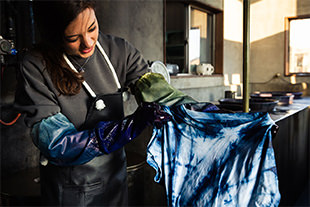
Learn Pattern-Making Techniques, Watch Transformations of Indigo Colors
The dye products of Takarajima Senkou are beautiful not only in color but also design. In the first half of this experience, learn how these patterns are created by examining Takarajima Senkou’s works. Make your own original pattern by combining resist-dyeing techniques such as itajime, shibori, and folding. After the preparations are set, move to the dyeing studio full of natural indigo vats to learn about the raw materials for dyeing. After understanding the indigo fermentation and coloring process, begin dyeing. It’s a special sight to watch the colors change from a dark green-brown to a beautiful indigo blue after dyed fabrics are exposed to oxygen. Before dyeing your own clothes and fabrics, you can practice with a complimentary tenugui hand towel to hone your skills first.
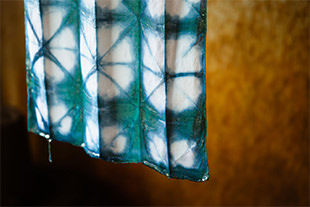
An Exclusive Visit to the Studio Shop Takarajima Soko
After enjoying an indigo dyeing experience at Takarajima Senkou’s workshop, which is usually not open to the public, head to Takarajima Soko, about a 10 minute walk away. An old rice warehouse that was renovated and opened in 2020, the studio shop stocks, exhibits, and sells Takarajima Senkou’s original brand products. Enjoy an exclusive tour of Takarajima Soko and its variety of naturally dyed products. If you wish, you can also do some shopping during this time. Take a dive into Takarajima Senkou’s world.
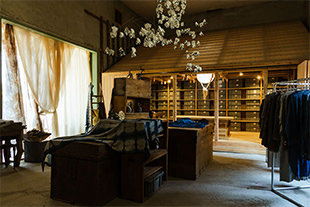
| Tour Code | GFMZ01 |
|---|---|
| Dates | Monday through Sunday |
| Duration | 4 hours |
| Schedule |
|
| Languages | Japanese●Supplementary explanations in English via translation device or lecture board can be provided upon request. Please make a note in the message box during registration to request this service.※An English interpreter can also be arranged for an additional fee. Please contact UNA Laboratories for more details. |
| Participants | Minimum 3 / Maximum 4 |
| Meeting Location |
Takarajima Senkou (Workshop) |
| Reservation Deadline | 5 days before the start of the tour
|
| Payment Method | Advance payment at the time of reservation (VISA, Mastercard, Amex, JCB) |
| Attire | Please wear clothes and shoes that you wouldn’t mind getting dirty. Please note that you will be asked to remove all jewelry, watches, and accessories from your arms during the experience. |
| Please Note |
|
| Cancellation Policy | 3 to 1 day(s) preceding the tour start date: 50% of the tour fee |
Travel Planning: Implementation
- UNA Laboratories Inc. (Fukuoka Prefectural Governor Registration #2-951)
- 3-12-22-302 Yakuin, Chuo-ku, Fukuoka-shi, Fukuoka Prefecture 810-0022
- TEL: 092-982-7956E-MAIL: tour@unalabs.jp
- Domestic Certified Travel Supervisors:
Aya Tamura, Noriko Yahata, Rei Watanabe - Business Hours:
9:00 a.m. to 5:00 p.m. Monday through Friday (Closed Saturdays, Sundays, and Holidays) - *Requests received outside of business hours will be processed the following business day.
- *Domestic Certified Travel Supervisors are responsible for transactions held at the sales office that processes customers’ travel. Please do not hesitate to contact the aforementioned Domestic Certified Travel Supervisors with any questions or concerns regarding the travel contract.
Tour Information
- Dates
- 13:00~
※The tour will not be held on dates marked with (-) on the reservation form.
- Duration
- 4 hours
- Recommended Age
- 10 years and older
- Price
- 15,800yen (tax included)
- Remarks
- ※ Material fee included.
※ Guests under 12 can accompany a parent or guardian on the studio visit (without the indigo dyeing experience) for free.

